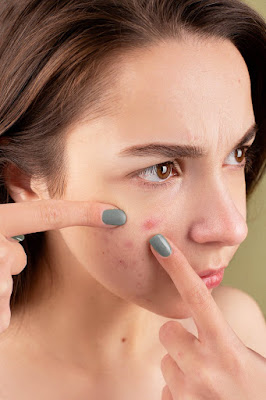Acne doesn’t just affect teenagers, but adults as well. While some teens with acne may notice that the acne goes away as they enter adulthood, for other teens, the acne may continue unabated into adulthood, while for others who never had acne as a teenager, they may suddenly develop adult acne. Acne is the most common skin condition, and before we can figure out how to stop it, we need to understand what it is.
What is acne?
As mentioned earlier, acne vulgaris is one of the most common skin conditions, affecting people all over the world (over 80% of the population). Acne manifests as minor bumps or pustules (pimples or large cysts). Although a complete understanding of the causes of acne is still underway, several theories link it to genes and hormonal activity.
I thought hormones to play an important role in the development of acne, particularly the male sex hormone, testosterone. Both men and women have this male hormone, with men obviously having more testosterone than women. When male hormone levels increase in both men and women, they stimulate the sebaceous (oil) glands into the skin to produce excessive amounts of sebum (oil).
These excessive amounts of sebum eventually clog pores as we release them from the sebaceous glands into the hair follicles they surround. The clogged pores then allow certain bacteria (propionibacterium acne) to grow and multiply. These bacteria then release certain enzymes that lead to inflammation of the hair follicles (we attach the sebaceous glands to the hair follicles). This inflammation can lead to swelling, followed by abduction, which allows the bacteria to spread through the skin and cause various acne spots.
We frequently found raised swellings resulting from acne on the face, back, neck, chest and shoulders. These bumps can be painful and itchy. In severe cases, acne can have pus-filled sacs that open up and cause fluid to flow. While hormonal imbalance at puberty is one cause of acne, hormonal imbalance can also occur during the menstrual cycle, during periods of stress, etc.
Using certain comedogenic (pore-clogging) cosmetics, known as cosmetic acne, can also cause acne. Certain medications can also cause acne (acne medicamentosa), such as certain epilepsy medications. There is another type of acne, acne rosacea, which is a unique form of severe acne and usually affects people over the age of 40. Acne rosacea is a complication of rosacea and is distinguished from other types of acne by inflammation (swelling), redness and dilated blood vessels. It is also usually centered on the nose and cheeks and rarely includes blackheads, but many pustules (pimples containing pus).
How to stop acne
Since this skin condition affects over 80% of the general population, it can be difficult, but not impossible, to treat it in order to have clear, blemish-free skin, or at least keep breakouts to a minimum. Most of us like to look good and acne can get in the way. Therefore, severe acne can rob the sufferer of self-esteem. Acne breakouts can cause a person to hide and not interact with others, as they may feel that others judge them negatively because of their acne. If acne is a big problem, here are some tips for stopping it and getting unblemished skin;
Keeping your face clean with an oil-free cleanser is sometimes all you need or a step in the right direction, especially with mild acne. However, washing your face more than twice a day can be too taxing on the skin and dry it out, causing the oil glands to produce excessive amounts of sebum or oil. Also, use a gentle hand. If you are too aggressive to make your skin clear and oil-free by using rough washcloths, scrubs, etc., then you should gentle with your skin. So be gentle with your skin. It is not your enemy, even if it sometimes feels like it is.
These are usually over-the-counter medications that can be used effectively for acne treatment. We usually include them in cleansers, toners, moisturizers, masks, etc. to help kill acne-causing bacteria and normalize excessive sebum production. Some of these ingredients, such as salicylic acid and sulfur, however, can be too irritating and drying for some people’s skin and can even make acne worse.
If this is your case, start with the lowest concentration and use products containing these active ingredients only once a day, then gradually increase to twice a day as your skin becomes more tolerant. Another option is to switch to benzoyl peroxide. Many dermatologists actually believe that benzoyl peroxide is the most effective acne ingredient available over the counter, but you should also start with the lowest concentration, especially if you have sensitive skin.
For moderate acne that does not respond to the above methods, eliminating this type of acne may require prescribing topical or oral antibiotics to fight the infection associated with acne development. If antibiotics (tetracycline, doxycycline, etc.) Do not work, the use of several vitamins A derivatives known as retinoids may be the next step. Vitamin A derivative commonly used for acne treatment includes retinoids such as isotretinoin (Accutane). Others include Differin and so on. We recommend these retinoids for severe cases of acne, such as cystic acne, that do not respond to other treatment methods.
The retinoids used work by penetrating the deep layers of the skin to reduce the sebaceous glands, which helps to decrease sebum production. Reducing sebum production reduces the risk of clogged pores and the amount of bacteria in them. While these retinoids can be very effective, some can be very drying to the skin and, worse, many can cause birth defects. Therefore, if you are pregnant, or plan to be in the future, avoid using retinoids. Even if you stop taking these drugs, they can stay in your system for many months or years before being eliminated from your body, which is something to keep in mind.
When adult acne becomes a problem for many women, one cause is usually fluctuating hormone levels. This is another reason some women report breakouts around the time of their menstrual cycle. Here, using certain birth control pills is one of the best ways to stop acne. Low-dose estrogen birth control pills can help regulate estrogen levels to help balance hormones. Other pills that target various other hormones in the body can also help balance hormone levels to help reduce or eliminate hormone-triggered acne.
If you suffer from acne, you have probably already searched the Internet for possible solutions to this stressful problem. Both on the Internet and on the market you can find various methods to get rid of acne and pimples, including potions and lotions. However, these types of products are expensive and do not guarantee 100% treatment of this skin condition.
Click https://deliverit.blogspot.com/p/acne-no-more.html for more details.
Stress levels can also affect hormone levels. If you suffer from chronic stress, this can lead to hormonal imbalances that can lead to acne and many other more dangerous effects of chronic stress. Stress is normal, but if you live with chronic stress day in and day out, your body and skin will suffer, so look for ways to properly manage your stress.





